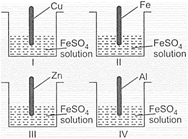Anil Ahlawat Solutions for Chapter: Metals and Non-Metals, Exercise 1: EXERCISES
Anil Ahlawat Science Solutions for Exercise - Anil Ahlawat Solutions for Chapter: Metals and Non-Metals, Exercise 1: EXERCISES
Attempt the free practice questions on Chapter 3: Metals and Non-Metals, Exercise 1: EXERCISES with hints and solutions to strengthen your understanding. NSO Science Olympiad Workbook Grade 10 solutions are prepared by Experienced Embibe Experts.
Questions from Anil Ahlawat Solutions for Chapter: Metals and Non-Metals, Exercise 1: EXERCISES with Hints & Solutions
Fill in the blanks by selecting the option with the correct words.
The process of removing impurities from impure metal to obtain pure metal is known as _____ of metal. The most widely used method for refining is _____. In this method, the impure metal is taken as _____ and the pure metal is taken at _____.
A non-metal is an important constituent of our food. It forms two oxides and is toxic and causes suffocation and even death while is responsible for global warming. Identify and .
A brief information about a few elements is given below:
: It is used in making electrodes.
: It is required for combustion.
: It is used to preserve food.
: It is used as fungicide.
and are respectively.
In which of the following beakers reaction will take place?

An ore on heating in air produces sulphur dioxide. Which process would you suggest for its concentration? Describe briefly any two steps involved in the conversion of this concentrated ore into related metal.
Which of the following statements about the given reaction is/are incorrect?
The mixture of and Al is ignited by inserting a magnesium ribbon and then burning it.
II. The reaction is used for welding the broken parts of iron machinery, railway tracks, etc.
III. The whole process is called aluminothermy.
IV. The reaction is highly endothermic.
Latin name for royal water is . It is a mixture of and in the ratio . Some of the properties of are different from and . What are and respectively?
Which of the following elements are metals?
(i)
(ii)
(iii)
(iv)
